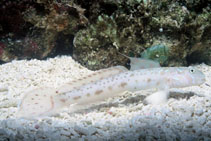| Family: |
Gobiidae (Gobies), subfamily: Gobiinae |
| Max. size: |
7 cm SL (male/unsexed) |
| Environment: |
reef-associated; marine; depth range 1 - 20 m |
| Distribution: |
Indo-West Pacific: Western Australia and Japan. |
| Diagnosis: |
Dorsal spines (total): 6-7; Dorsal soft rays (total): 12-12; Anal spines: 1-1; Anal soft rays: 12-12. Characterized by pale grey color grading to white ventrally; presence of blue-edged red to pink band from occiput to cheek; side of body with variable-sized brown spots on side of body and on dorsal and caudal fins; some larger spots (on shoulder region and first dorsal fin) surrounded by small blue-white spots; upper half of side of body and along base of second dorsal fin with scattered small blue-white spots; hard and pungent first dorsal spine of first dorsal fin, fifth spine forming short filaments; lanceolate caudal fin; longitudinal scale series 29-32; all scales cycloid; predorsal scales absent; depth of body 6.8-7.8 in SL (Ref. 90102). |
| Biology: |
Occurs on clear sandy bottoms with fast tidal currents. Retreats in burrows made possibly by sea cucumbers or polychaetes (Ref. 30347). |
| IUCN Red List Status: |
Least Concern (LC); Date assessed: 15 August 2023 Ref. (130435)
|
| Threat to humans: |
harmless |
Source and more info: www.fishbase.org. For personal, classroom, and other internal use only. Not for publication.
